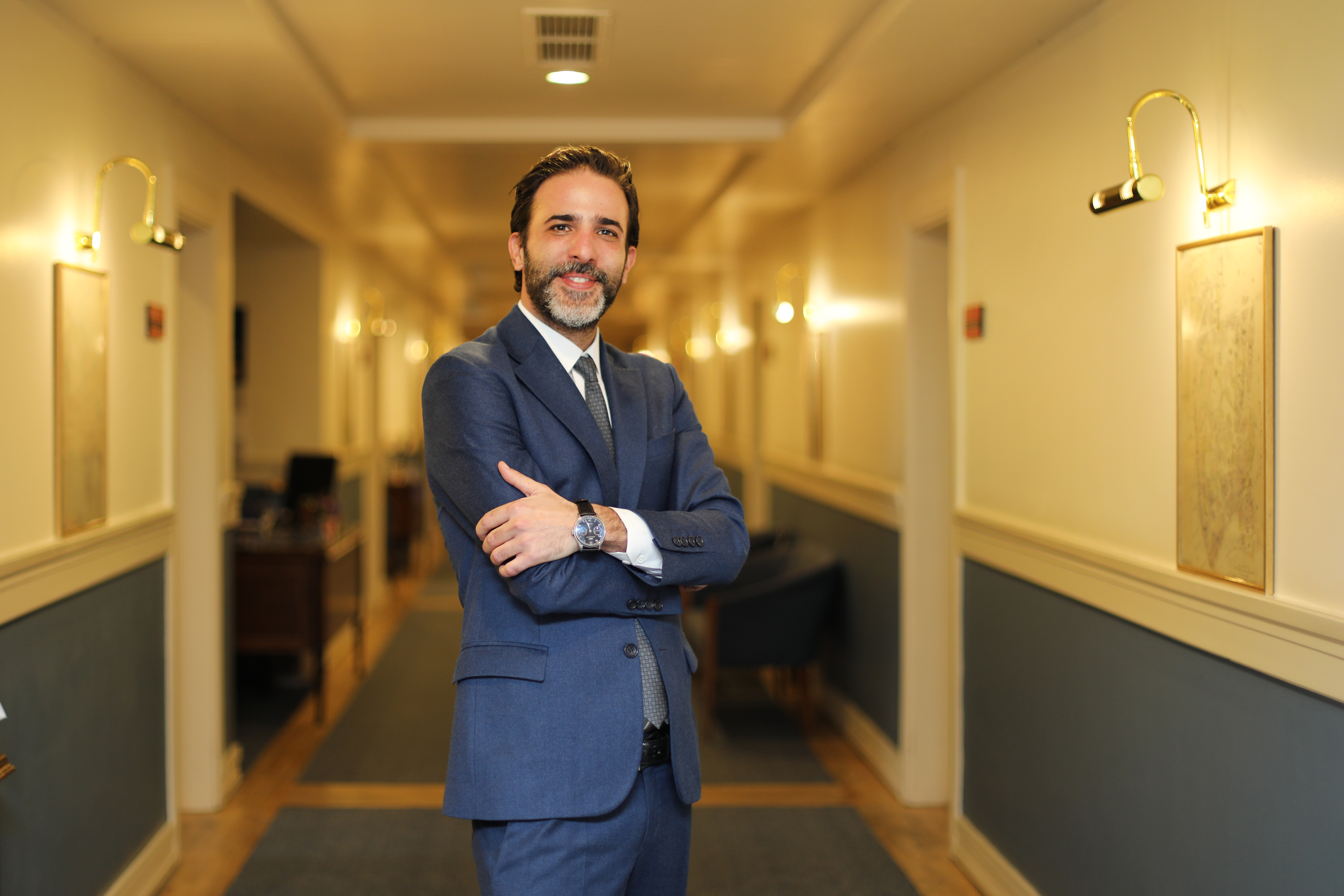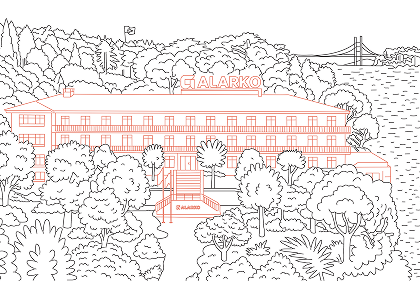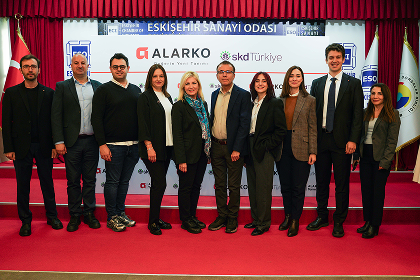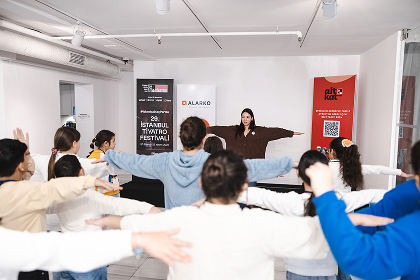Conversation with Tal Garih on "The New Normal of Society"
We continue our conversations in which we discuss the new normal and the changes brought along by the Coronavirus with opinion leaders from various sectors.
Tal Garih is one of the third-generation representatives of Alarko Group of Companies, which is one of the most-established groups of Turkey, and is a very versatile person. I call him "unstoppable energy". In addition to managing, along with his team, the strategy and digital transformation of an important group like Alarko, he also serves as the Chairman of the Board and faculty member of Business Management School of Bahçeşehir University (he was also the person who referred me to Bahçeşehir University as a lecturer). Besides, he is also a Board Member of Yenibirlider Association and the mentor of various entrepreneurs. However, in addition to these important efforts, he is also a very sincere, modest and positive manager towards everyone. Believing that ""We" comes before "Me", and everything is about team spirit", he always gives priority to teamwork, and explains his vision by saying "we need to set the route rather than catching the train", breaking the leadership mold.
He holds a very special and unique place in my heart. He is not only a friend whom I always talk to and hang out with, but also a friend with whom I share everything in common trust. His intellectual energy, diverse perspective, strong analyzing skill and ability to assess things from different perspectives have made great contributions to me as his friend.
We have spoken to Tal, who believes that the Post-Corona era will be a new milestone together with PC1 (1 year after Covid-19), about the new world order after Corona virus in all aspects. Here are the highlights from this pleasant conversation which contains important insights about the society's new normal, the outstanding trends, economic impacts, key issues to be considered, the future of education, new platforms, new competencies and new-generation leadership.
Ergi Şener: Together with the Coronavirus, we have experienced a quarantine period involving uncertainties and requiring fast actions. We are now adapting to the "new normal" process, in which we start to socialize again gradually. Still, we do not know how the process will proceed, and our life has already started to take a new direction. As a businessperson and academician working in various fields and sharing opinions on forward-looking estimates, how do you assess this process we face in general? Was it easy for both the business circles and citizens to adapt to the process? In which areas, will the Post-Corona period bring changes do you think?
Tal Garih:Covid-19 pandemic is an unprecedented event experienced within the last 100 years. No one has experienced a similar situation before, and this is an era of great uncertainties. This stimulates "reptilian brain", and may result in stress and alarms. Fortunately, we are in a far better position thanks to modern medicine and technology today, we have revealed the genome of the virus and the vaccine will soon be developed. However, on the other hand, the global economic recession caused by this virus that has arrived like a tsunami will cause more permanent damages. In the economic crises of the past, the collapse of the financial system used to have an impact on the real economy including the Great Depression. Since the activity on the streets stopped, the financial system stumbled. The consequences of this outbreak will be the biggest damage to be caused to the modern economy, and the medicines of the known diseases will only relieve the symptoms and will not be sustainable.
Ok, what about the solution? I believe that in the not-too-distant future, artificial intelligence algorithms will manage the markets and all systems. Considering that these algorithms think in a different manner than us, it is possible for problems to arise. As Yuval Harari says, health-oriented biometric surveillance commissioned with a view to "protecting" people allows knowing what people think and how they feel, and thus can manipulate people. With a positive systematic transformation, we can shape promising, inspiring and super-smart societies in accordance with Society 5.0 principles to avoid the creation of data colonies. Thus, it is essential to manage people in the right manner during times of uncertainties.
Half of the existing jobs is expected to go extinct within 13 years. It is now the time to redesign our business models in the new world order involving exponential changes and multiplier effects. Computing power is expected to exceed brain power in 2023, and to become stronger than the brain force of the humankind by 2045. While the humankind moves fast towards neurological webs with Industry 4.0, the purpose should be benefiting the society, environment, values and sustainable systems. The future will be shaped by those who focus on purpose rather than profitability, network management rather than hierarchy, gaining authority rather than control, experimentally rather than planning, and transparency rather than privacy and thus break the mold and those who always seek new ways.
The companies which can successfully adapt to transformation focus on how to organize the work on a multi-channel basis. Those who revise the works to be done as required by the new order now redesign their processes, infrastructures and business models from scratch in a team spirit and with the right data analysis. Innovation management will be successful only in this manner. There is no favorable wind for the sailor who does not know where to go.
The Post-Corona era will be a new milestone together with PC1 (1 year after Covid-19). It feels like the Covid-19 has pushed the flash-forward button in the time-loop, and we have found ourselves in a futuristic movie in only 1 week as if we went through a change of 10 years. While the face of our world is changing, people, works, tone of communication and global trends also change. While citizens are more mobile and free, works are carried over to digital platforms and are evolved into freelancing and solopreneurial models.
While major governments are on the rise, cities are reprogrammed. Since demand will not return immediately, consolidations are increasing and competitor analyses are becoming more important every day. While future marketplaces and all sectors are consolidated and transformed, they will result in the emergence of digital ecosystems, smart structures, human-oriented approaches and strategies that increase environmental awareness. Highlights on corporate responsibility, purpose and added value will add value to brands and make them sustainable. Whatever we do, we first need to protect our own assets, make them sustainable and transform them subsequently. The future has arrived and in this connection, we need to realize that everything has changed fundamentally and it is the time to take action, encourage people, engage in cooperation and employ intellectual flexibility.
Ergi Şener: We can state that Covid-19 process has a catalyst effect in terms of digital transformation. As a manager working in the field of "change management" who has also assumed the task of "digital transformation" of a giant group like Alarko, what would you recommend for the digitalization and digital transformation management of our organizations in this era?
Tal Garih: Digital transformation creates inevitable and amazing opportunities. This transformation has two driving forces, which are external and internal factors. Change is the only constant in life. Internal factors are about the companies and structures taking the right path during their lifecycle. Companies that transform as they get older get stronger, but those that only age die out. External factor is the new world order being reshaped with an exponential growth, to which we need to adapt. While the life span of the world's top S&P 500 companies was 61 in 1958, this fell to 15 years in 2018. 50% of the revenue of these giant companies is based on the products and services they developed in the latest years. It is too difficult for the companies which fail to keep up with this speed to survive. On the other hand, human force will not have the same place because of various algorithms and robots developed. While the life of both blue- and white-collar workers is changing at a fast pace, we are evolving to a more optimized human force. The outbreak has resulted in the biggest "home-based working" challenge in the history of the mankind, and big changes started to occur in the global office culture after this kind of working was seen to be more efficient. The days where the companies will have their headquarters in the cloud are soon to arrive. While many large companies such as Facebook make their transition to home-based working model by the end of 2020, Twitter CEO Jack Dorsey said that he could permanently continue the home-based working model if deemed necessary for its employees who were granted the permission to work from home.
Digital transformation is not only about superficial digitalization.. This transformation covers every stage from organizational charts to the structure of labor force and the creation of a virtual company culture. The most important components of each structure are surely human and data again. These two components constitute a whole in fact. During these days where we have reached singularity, integration of humankind with technology is gaining speed, and virtual personalities of different attributes and avatars are needed.
Qualified human force is essential for the organizational structure involving human to interpret data. Even when we are the smallest actor, we achieve passion when we can shape the areas in which we will be in the pilot position thanks to agile management. The key milestone is to answer the question "why do we do it?" before answering the questions of "How shall we do it" and "What shall we do?". Teams may create innovative business models only by adopting an encouraging attitude. Everyone focuses on rewards, and carrots are distributed in a box. The real success comes when people are encouraged and actors are prompted to come out of boxes. We can achieve motivation and efficiency if we can detect the leaders among us using the right tools and with an entrepreneurship spirit.
On the other hand, we need to shape omni-channel strategies while digital migration is gradually increasing. Winners will be those who can shape platform-based real-time business models based on data provision, which are independent from sectors. We will be able to offer an end-to-end experience by interpreting the gathered data and attributing value to the algorithms, and thus make the right and measurable decisions. Data are gathered exponentially meanwhile. We will need to offer solutions by answering the questions of "How will we protect the corporate data on virtual cloud?" and "How will we access data from various points?". In short, everyone needs to be data driven and turn into data companies. However, it will not be enough to benefit from new technologies to do that, and real opportunities will be offered only if we can place purpose and human on the core of everything.
Ergi Şener: You are also a manger who has a strategic role in Alarko, a very important and large group for our country. Would you also give us brief information on the actions you took at Alarko Holding and their consequences?
Tal Garih: Alarko has a history of 66 years. We manage changes at Alarko in parallel with organizational memory management. Magic happens when there is teamwork and synergy among generations. I believe that real leadership is accomplished by ensuring that different leaders act in collaboration with each other. We have a culture and universal values based on collective conscience that puts leadership beyond individual leaders and "we" before "me". We have learned from our founders that real success is ensured by making others lead adhering to the principle that there is no single leader if there is leadership. We are a group that gives people authority and believes that union makes strength.
We aim to be the strongest and the most respected rather than being the largest. We always focus on the question "What kind of a mark do we want to leave on people's hearts and minds?". We are aware that the answer to the question of "What should be our focus?" changes constantly. We focus on the methods ensuring the right communication, solidarity and sustainability.
Our first priority is to protect staff and set a common value in order to best keep up with the future. Digital transformation places human at its center. We are focusing on bilateral communication through the use of digital management procedures. We offer employees with a sense of belonging, flexibility, awareness and trust through the use of various digital platforms. We try to create a sense of responsibility through providing support, ensuring a sense of ownership of our values and telling our story of existence. This is because we may be pioneers only when we ensure that all interrelated wheels of the system exceed their potential. Everything is based on coordination, common sense, team spirit and motivation.
Another priority for us is to ensure the financial analyses and supply-demand balance in order to adapt to the changing order and expectations of stakeholders and customers within the scope of the new normal. We are designing proactive scenarios with new Covid-19 management policies. We also inquire into new innovative business models at the same time. We are creating our strategies and roadmaps by making use of the right technological tools in addition to offering continuous trainings.
In short, we are trying to become a pioneering company embracing digital transformation and consisting of qualified human force and valuable teams. We try to be a brand that sets an example both in the country and on the global arena, that adds value and that produces consistent results. We engage in various collaborations within the ecosystem in order to do that efficiently. We create strong teams by focusing on the synergy among generations.
Ergi Şener: You are also very active as the Chairman of the Board and Member of School of Business Administration of Bahçeşehir University. As far as I am concerned, you also hold information exchange meetings with various global corporations. Radical changes take place in the education sector together with the Coronavirus outbreak. What do you think about the future of education? Do you believe that university education is possible solely through online courses?
Tal Garih: Modern education is key to everything. “Educating the mind without educating the heart is no education at all and it is dangerous to have knowledge without conscience”, says Aristotle. Even though the key competencies always change in this evolving world, we need to pay attention to being good people. “The most important qualifications of an employee will consist of learning and adaptation abilities in future”, says Ginni Rometty, IBM's former CEO. Analytical and critical thinking, creativity and emotional intelligence are far more important than technical skills. This is because the most important competence will be the ability to interpret data and attribute increased value to human. If we happen to attribute incorrect values and become parents equal to algorithms, developments that could be a blessing may result in backlashes. This is why education needs to continue constantly and should not be limited to universities only. We stumble and get old when we quit education.
Education needs to continue in collaboration and partnership with academic institutions, private sector, public agencies, NGOs and other stakeholders. Interaction among the stakeholders will enable them to establish common programs and set the route. We will create win-win scenarios by allowing businesspeople to lecture at universities and offering mix programs such as corporate MBA.
Unfortunately, education fell from favor. As Professor Selçuk Şirin says, I also believe that 90% of the existing universities will vanish in future. While 10% of the existing university students will continue their education in class, the other 90% will receive modern education with other methods as required by the new normal. There will be more functional and effective methods than paying high tuition fees and waiting for these long periods to receive a diploma. Today, the competencies of the majority of the new graduates are not only insufficient for business life but also add limited value to the business. However, there are optimized modules being offered through various platforms including Facebook.
Instead of going through a formal education, majority of the youth will have the chance to ensure personal development and acquire competencies with the "badging" system as in the case of gamification. The CVs will focus on the candidate’s badges won rather than the schools they graduated from. We will be able to receive flexible education in various fields of interest such as coding, scouting, mentoring and human management certifications. We are evolving into a system that is more flexible for students and more effective for organizations.
During this transformation, education will also be based on algorithms. An algorithm that knows us better than our closest friends and relatives will work with us, and code the curricula online. A research by Stanford University has revealed that software applications get to know us better when we hit the like button for more than 300 times on Facebook or Instagram. Thus, shaping these algorithms in the right manner will be decisive for our future. On the other hand, we will learn about communication, team spirit and emotional intelligence on offline platforms. Student-specific education systems will be created consisting of a mix of online courses and physical classes. We will design special education programs in line with job-related expectations.
As competencies differentiate, we will always work, learn and experience through various channels. Not only academicians but every one of us has responsibilities as regards this smart virtual education.
Ergi Şener: What do you think about open skill economy? What would you recommend entrepreneurs during this process?
Tal Garih: Within five years, 76% of the labor force is expected to consist of Generations Y, Z and Alpha and a large part of these new generations desires to be entrepreneurs or freelancers. Nearly half of the labor force is working with this kind of flexible working methods in the US. I suppose that part-time working methods will increase at a fast pace in the new world order. 69% of Generation Y states that they prefer to be solopreneurs if they can have the sufficient number of projects and income, while 79% of them state that they consider working for themselves. Two third of them state that they are working within more flexible structures compared to the past. Various researches also reveal that the sense of responsibility, reputation and financial performance increase in parallel to flexibility. Flexible time, space, job description and employment methods all boost performance. I believe that skill management is one of the most important issues that must be focused especially while virtual working environments increase at a fast pace. In this connection, I suggest that everyone discovers their entrepreneurial spirit and the leader inside them. We can seize the moment and realize our potential only if we can do that. We can make use of our gifts by using the right tools, add value and thus catch up with the flow. Taking strong steps by carrying out data analyses without falling in love with our own ideas in the flow is a must in this new era. Therefore, I recommend entrepreneurs to do the things they love and are passionate about by designing smart models. I believe that the bold people who seek answers to the question “What would you do if money was not a factor" are those to cause the butterfly effect. Let's move together towards Society 5.0.


Alarko Holding Continues to Offset the Carbon Footprint of its Ortaköy Headquarters Campus

Field Analysis on Sustainable Agriculture by Alarko Holding and SKD Türkiye








